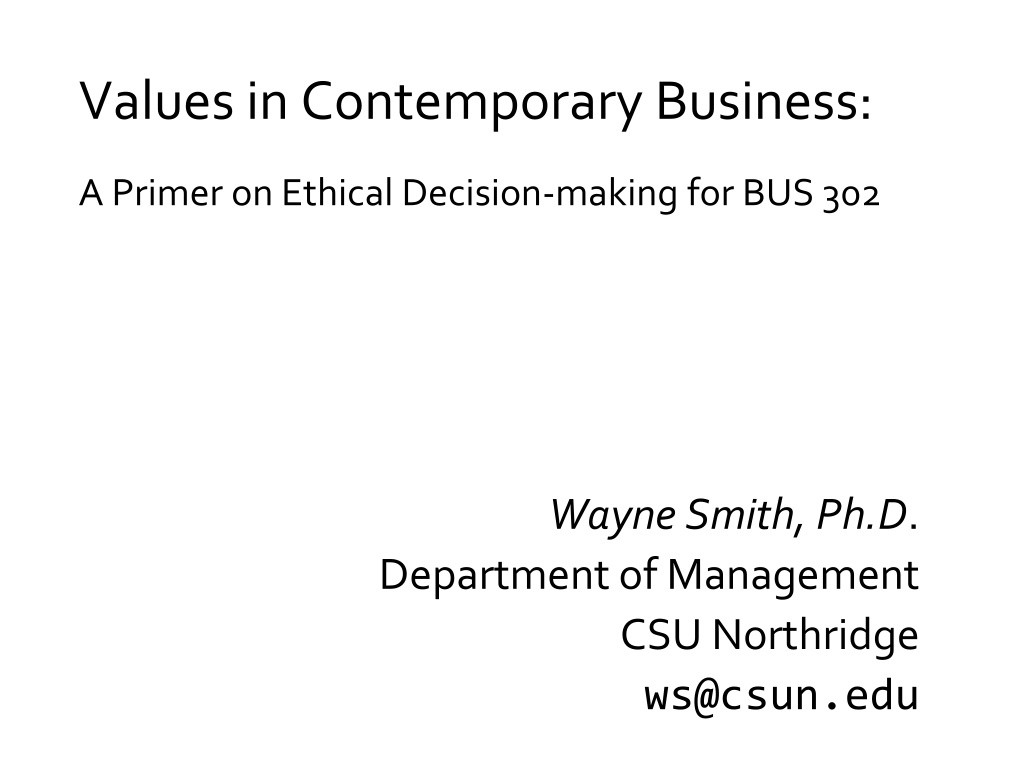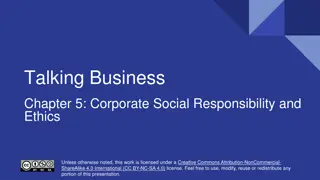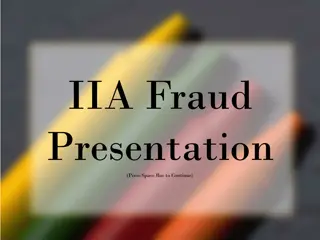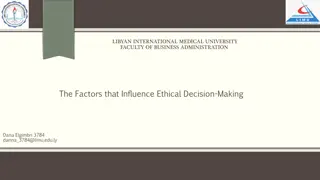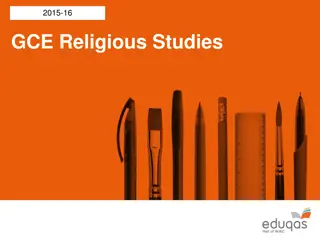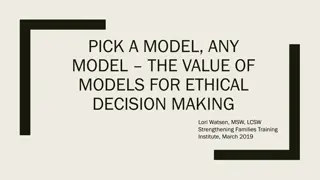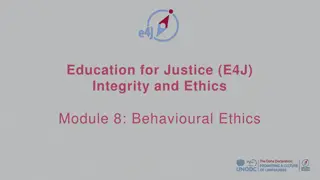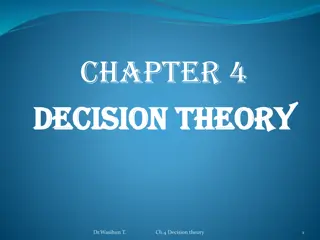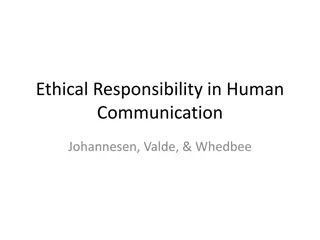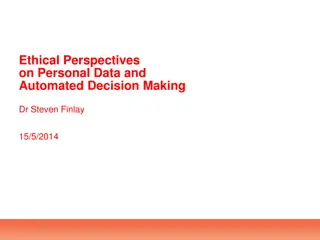Ethical Decision-Making in Contemporary Business
In the realm of contemporary business, understanding the nuances between legal and ethical decision-making is crucial. While legality ensures compliance, ethics delve into how one should act when faced with conflicting values. This primer delves into the differences between legality and ethics, and offers insights on analyzing ethical dilemmas in business using multiple decision-making theories and frameworks. It emphasizes the importance of considering stakeholders, consequences, and ethical theories when making decisions. Two prominent approaches, the Tucker and Velasquez methods, are highlighted to guide individuals in evaluating alternatives based on profitability, legality, fairness, stakeholder rights, and environmental impact.
Download Presentation

Please find below an Image/Link to download the presentation.
The content on the website is provided AS IS for your information and personal use only. It may not be sold, licensed, or shared on other websites without obtaining consent from the author. Download presentation by click this link. If you encounter any issues during the download, it is possible that the publisher has removed the file from their server.
E N D
Presentation Transcript
Values in Contemporary Business: A Primer on Ethical Decision-making for BUS 302 Wayne Smith, Ph.D. Department of Management CSU Northridge ws@csun.edu
Legal and Ethical are sometimes similar If one is acting within the law, presumably one is acting ethically. The law defines specific duties. Some conduct is prescribed. Some conduct is allowed. Some conduct is proscribed. If you are in Compliance no further action There is formal punishment for illegal conduct. Statues and Regulations balance competing values. 2
Legal and Ethical are sometimes different Ethics offers guidance on how one should act. Addresses situations where competing values clash. Action or inaction may be controlled by a formal or an informal process. Ethics can be seen, therefore, as action beyond mere compliance to legal duty. So what, therefore, is ethical decision-making? 5
How to Analyze Ethical Dilemmas in Business Identify the key ethical issue(s) Identify primary (direct) and secondary (indirect) stakeholders You need to incorporate their positions and perspectives Use an ethical decision-making approach (this provides structure for the argument) You need a cohesive, understandable organization (choose one of the two Tucker or Velasquez (if not specifically provided by the instructor) Use multiple ethical decision-making theories/models/frameworks to answer each part (this provides strength for the argument) You must base your argument in rigorous, relevant theory Compare alternatives and assess consequences You identify all major alternatives and estimate outcomes
Ethical Decision-making Approach Tucker Evaluate each alternative on: Is the decision profitable (shareholders)? Is the decision legal (society at large)? Is it fair? What is the impact on the rights of stakeholders? What is the impact on sustainable development (environment)?
Ethical Decision-making Approach Velasquez Moral Standards Approach Is the decision Of net benefit to society? Fair to all stakeholders (fair distribution of benefits and burdens)? Consistent with each person s rights?
Ethical Decision-making Theories Philosophical Branches of Ethics These are ones that have had the widest impact over time 1. Utilitarianism ( evaluated by the consequences/value ) 2.Deontology ( inherent duty ) 3. Nicomachean ( moral virtues ) Applied Branches of Ethics These are combinations and derivatives of the first three 4.Rights Theory ( freedom, fairness, and equality ) 5.Justice Theory ( harm to a single individual ) 6.Corporate Social Responsibility ( organizational values ) 9
Ethical Decision-making Theory Utilitarianism Definition Utilitarianism is a branch of Consequentialism We evaluate the ethical decision by its results Jeremy Bentham, John Stuart Mill, Henry Sidgwick Key Assumption We can identify and understand values, outcomes, and consequences Key Decision Measured Benefits divided by Measured Costs Best Ethical Decision Key Question(s) What is the greatest good for the greatest number? What is the maximum, long-run, aggregate utility for a population? 10
Ethical Decision-making Theory Deontology Definition We evaluate the ethical decision by its relationship to a person s inherent duty Georg Hegel, Immanuel Kant, Thomas Nagel, Tim Scanlon Key Assumption An individual s duty rises in scope and import with one s knowledge Key Decision Endowments subject to Burdens Best Ethical Decision Key Question(s) Categorical Imperative What is right, fair, and just for another individual (without having to evaluate the consequences or use religion)? Reciprocity What is the best, empathic relationship for both individuals or organizations? Enlightened Self-Interest What improves others interests and improves my interests? 11
Ethical Decision-making Theory Rights Definition We evaluate the ethical decision by its relationship to certain inalienable rights Isaiah Berlin, Wesley Hohfeld, John Locke, Jean-Jacques Rousseau Key Assumption Rights enable an individual s interests, well-being, will, and choice Key Decision Legal Rights plus Natural Rights Best Ethical Decision Key Question(s) Does this decision advance Rights to claim, privilege, power, and immunity? Fair and equal treatment? Privacy and personal security? Opportunity to keep one s wealth and property? Freedom to achieve self-actualization (e.g., life, liberty, and the pursuit of happiness)? See also The First 5 amendments to the U.S. Constitution 12
Ethical Decision-making Theory Justice Definition We evaluate the ethical decision by its applicability to a single individual Thomas Hobbes, Robert Nozick, Cha m Perelman, Plato, John Rawls Key Assumption A civil society values order, equity, balance, and proportionality Key Decision Best for an Individual multiplied by Best for Society Best Ethical Decision Key Question(s) Can inequity or harm to a single individual be justified? Key Types of Justice Is the process fair and equal? (procedural justice) Is there a fair distribution of benefits and burdens? (distributive justice) Is the punishment appropriate? (retributive justice) Can we repair any harm done? (restorative justice) 13
Ethical Decision-making Theory Nicomachean Definition Aristotle ( virtues ): Courage, Temperance, Liberality, Generosity, Magnamity, Moderation, Gentleness, Friendliness, Truthfulness, Sense of Shame Aristotle ( vices ): Is neither prodigal nor stingy, Has neither deficits nor excess, Has disposition but lacks achievement Confucius ( virtues ): Humaneness, Justice, Proper rites, Knowledge, Integrity, Loyalty, Honesty, Kindness, Bravery, Respect, Modesty Machiavelli ( vices ): Brute force, Duplicitous guile, Criminal virtue Key Assumption Individuals have free will and can choose correct or best paths Key Decision Virtues approach and Vices approach 0 Best Ethical Decision Key Question(s) What descriptive attributes will others ascribe to me? As an educated person, what will others expect of me? How will I be evaluated in the long run? 14
Ethical Decision-making Theory Corporate Social Responsibility Definition ( organizational values ) Organizational Values H. Bowen, A. Carroll, K. Davis, P. Drucker, E. Freeman, D. Wood Key Assumption A company s vision and mission supports society s wider values Key Decision Aligned with Organizational values Best Ethical Decision Key Question(s) Is this decision aligned(i.e., consonant ) with our espoused organizational values, vision, and mission? Duty of Care? Loyalty? Diligence? Prudence? What are the SystemsEffects and/or SideEffects ? What key aspects of labor and capital does Business/Industry control? (traditional term) Triple Bottom Line Planet, People, Profit (contemporary term) Environmental, Social, and Governance (ESG) 15
Citations and References You can either use my Powerpoint or You can use the Stanford Encyclopedia of Philosophy https://plato.stanford.edu/ 16
Tests and Questions Front page test: (Nichomachean, Corp. Social Responsibility) Would I be embarrassed if my decision became a headline in the local news-paper? Would I feel comfortable describing my actions or decision to a customer or stockholder? Golden rule test: (Deontology) Would I be willing to be treated in the same manner? Dignity and liberty test: (Rights, Justice) Are the dignity and liberty of others preserved by this decision? Is the basic humanity of the affected parties enhanced? Are their opportunities expanded or curtailed? 17
Tests and Questions Equal treatment test: (Justice) Are the rights, welfare, and betterment of minorities and lower status people given full consideration? Does this decision benefit those with privilege but without merit? Personal gain test: (Nichomachean, Utilitarianism) Is an opportunity for personal gain clouding my judgment? Would I make the same decision if the outcome did not benefit me in any way? Congruence test: (Nichomachean, Corp. Social Resp.) Is this decision or action consistent with my espoused personal principles? Does it violate the spirit of any organizational policies or laws? 18
Tests and Questions Procedural justice test: (Deontology, Justice) Can the procedures used to make this decision stand up to scrutiny by those affected? Cost-benefit test: (Utilitarianism) Does a benefit for some cause unacceptable harm to others? How critical is the benefit? Can the harmful effects be mitigated? Good night s sleep test: (Nichomachean) Whether or not anyone else knows about my action, will it produce a good night s sleep? 19
